
试卷代号:2155 中央广播电视大学2008一2009学年度第二学期“开放专科”期末考试 英语阅读(1)试题 2009年7月 注意·事项 一、将你的学号、姓名及分校(工作站)名称填写在答题纸的规定栏 内。考试结束后,把试卷和答题纸放在桌上。试卷和答题纸均不得带 出考场。 二、仔细阅读每题的说明,并按题目要求答题。答案必须写在答题 纸的指定位置上,写在试卷上无效。 三、用蓝、黑圆珠笔或钢笔答题,使用铅笔答题无效。 908
试卷代号:2155 中央广播电视大学2008-2009学年度第二学期“开放专科”期末考试 英语阅读(1) 试题 2009年 7月 注 意 事 项 一、将你的学号、姓名及分校(工作站)名称填写在答题纸的规定栏 内。考试结束后,把试卷和答题纸放在桌上。试卷和答题纸均不得带 出考场。 二、仔细阅读每题的说明,并按题目要求答题。答案必须写在答题 纸的指定位置上,写在试卷上无效。 三、用蓝、黑圆珠笔或钢笔答题,使用铅笔答题无效
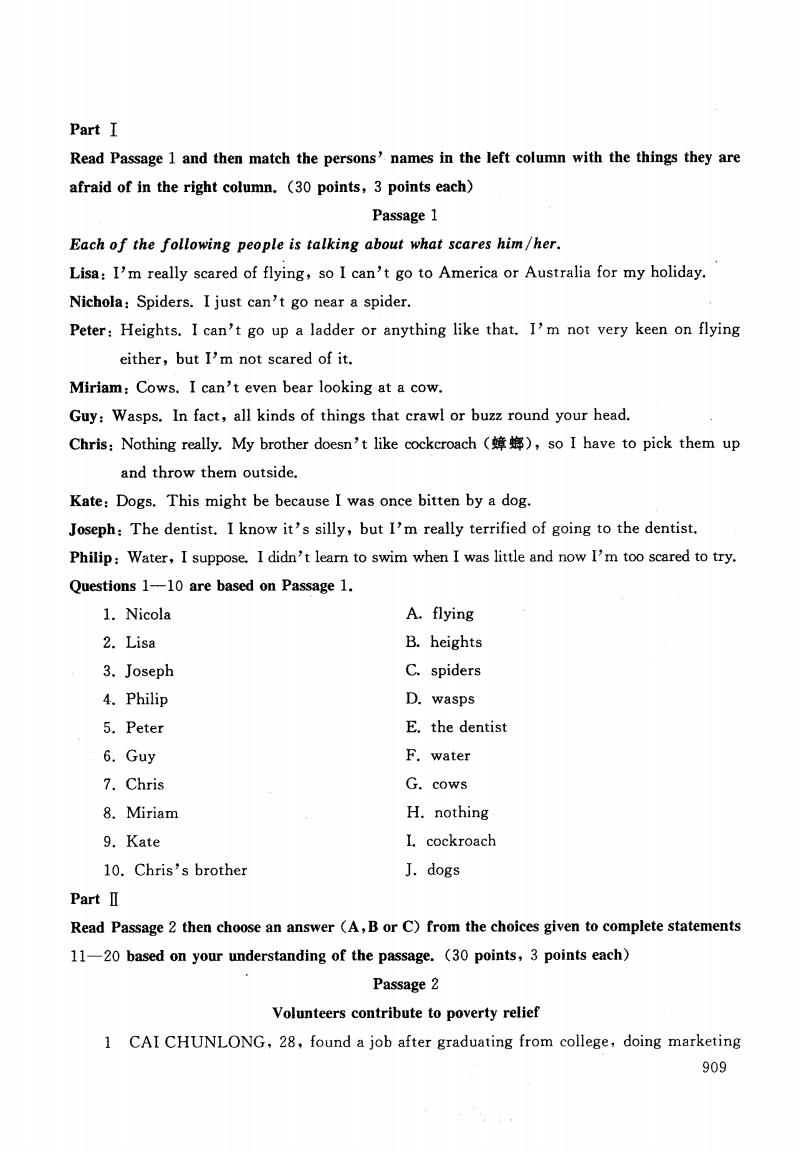
Part I Read Passage 1 and then match the persons'names in the left column with the things they are afraid of in the right column.(30 points,3 points each) Passage 1 Each of the following people is talking about what scares him/her. Lisa:I'm really scared of flying,so I can't go to America or Australia for my holiday. Nichola:Spiders.I just can't go near a spider. Peter:Heights.I can't go up a ladder or anything like that.I'm not very keen on flying either,but I'm not scared of it. Miriam:Cows.I can't even bear looking at a cow. Guy:Wasps.In fact,all kinds of things that crawl or buzz round your head. Chris:Nothing really.My brother doesn't like cockcroach ()so I have to pick them up and throw them outside. Kate:Dogs.This might be because I was once bitten by a dog. Joseph:The dentist.I know it's silly,but I'm really terrified of going to the dentist. Philip:Water,I suppose.I didn't learn to swim when I was little and now I'm too scared to try. Questions 1-10 are based on Passage 1. 1.Nicola A.flying 2.Lisa B.heights 3.Joseph C.spiders 4.Philip D.wasps 5.Peter E.the dentist 6.Guy F.water 7.Chris G.cows 8.Miriam H.nothing 9.Kate I.cockroach 10.Chris's brother J.dogs Part II Read Passage 2 then choose an answer (A,B or C)from the choices given to complete statements 11-20 based on your understanding of the passage.(30 points,3 points each) Passage 2 Volunteers contribute to poverty relief 1 CAI CHUNLONG,28,found a job after graduating from college,doing marketing 909
Part I Read Passage 1 and then match the persons' names in the left column with the things they are afraid of in the right column. (30 points, 3 points each) Passage 1 Each of the following people is talking about what scares him/her. Lisa; I'm really scared of flying, so I can't go to America or Australia for my holiday. Nichola: Spiders. I just can't go near a spider. Peter: Heights. I can't go up a ladder or anything like that. I’m not very keen on flying either, but I'm not scared of it. Miriam: Cows. I can't even bear looking at a cow. Guy: Wasps. In fact, all kinds of things that crawl or buzz round your head. Chris: Nothing really. My brother doesn't like cockcroach(嶂螂),so I have to pick them up and throw them outside. Kate: Dogs. This might be because I was once bitten by a dog. Joseph: The dentist. I know it's silly, but I'm really terrified of going to the dentist. Philip:Water, I suppose. I didn't learn to swim when I was little and now I'm too scared to try. Questions 1一 10 are based on Passage 1. 1. Nicola A. flying 2. Lisa B. heights 3. Joseph C. spiders 4. Philip D. wasps 5. Peter E. the dentist 6. Guy F. water 7. Chris G. cows 8. Miriam H. nothing 9. Kate I. cockroach 10.Chris's brother J. dogs Part II Read Passage 2 then choose an answer (A, B or C) from the choices given to complete statements 11一20 based on your understanding of the passage. (30 points, 3 points each) Passage 2 Volunteers contribute to poverty relief 1CAI CHUNLONG, 28,found a job after graduating from college, doing marketing 909
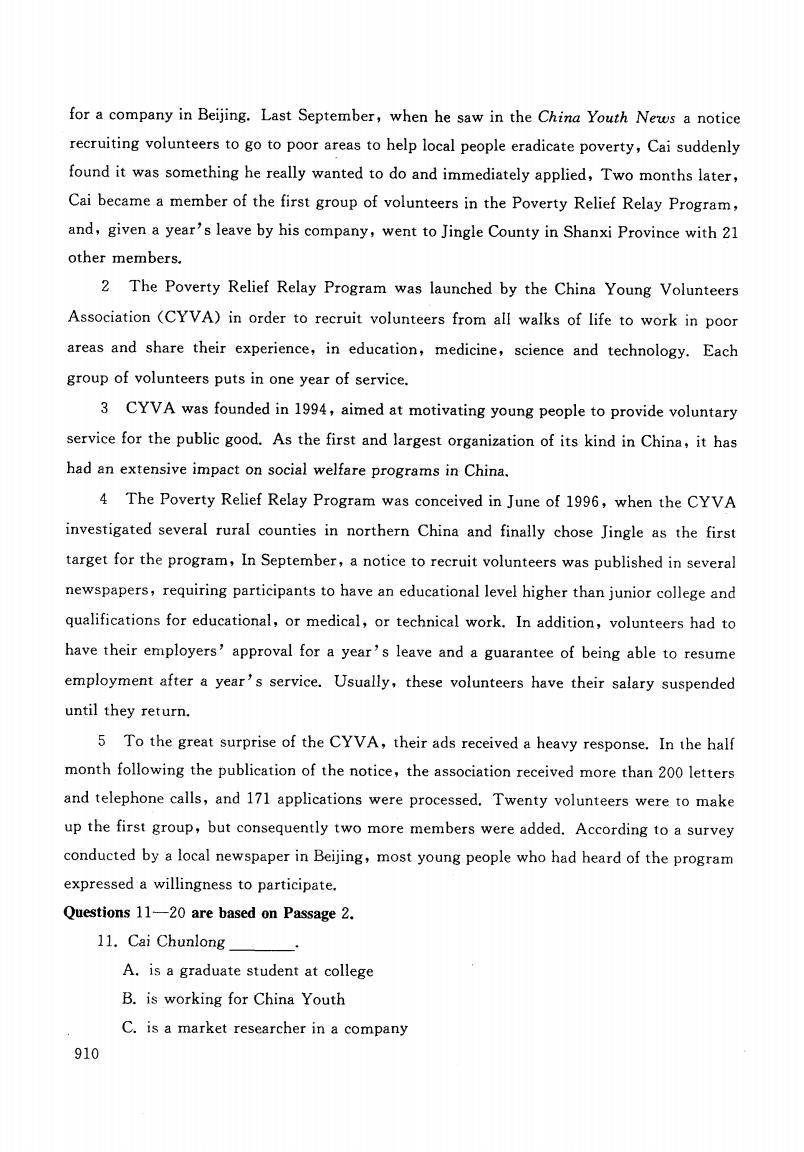
for a company in Beijing.Last September,when he saw in the China Youth News a notice recruiting volunteers to go to poor areas to help local people eradicate poverty,Cai suddenly found it was something he really wanted to do and immediately applied,Two months later, Cai became a member of the first group of volunteers in the Poverty Relief Relay Program, and,given a year's leave by his company,went to Jingle County in Shanxi Province with 21 other members. 2 The Poverty Relief Relay Program was launched by the China Young Volunteers Association (CYVA)in order to recruit volunteers from all walks of life to work in poor areas and share their experience,in education,medicine,science and technology.Each group of volunteers puts in one year of service. 3 CYVA was founded in 1994,aimed at motivating young people to provide voluntary service for the public good.As the first and largest organization of its kind in China,it has had an extensive impact on social welfare programs in China. 4 The Poverty Relief Relay Program was conceived in June of 1996,when the CYVA investigated several rural counties in northern China and finally chose Jingle as the first target for the program,In September,a notice to recruit volunteers was published in several newspapers,requiring participants to have an educational level higher than junior college and qualifications for educational,or medical,or technical work.In addition,volunteers had to have their employers'approval for a year's leave and a guarantee of being able to resume employment after a year's service.Usually,these volunteers have their salary suspended until they return. 5 To the great surprise of the CYVA,their ads received a heavy response.In the half month following the publication of the notice,the association received more than 200 letters and telephone calls,and 171 applications were processed.Twenty volunteers were to make up the first group,but consequently two more members were added.According to a survey conducted by a local newspaper in Beijing,most young people who had heard of the program expressed a willingness to participate. Questions 11-20 are based on Passage 2. 11.Cai Chunlong A.is a graduate student at college B.is working for China Youth C.is a market researcher in a company 910
for a company in Beijing. Last September, when he saw in the China Youth News a notice recruiting volunteers to go to poor areas to help local people eradicate poverty, Cal suddenly found it was something he really wanted to do and immediately applied, Two months later, Cai became a member of the first group of volunteers in the Poverty Relief Relay Program, and,given a year's leave by his company, went to Jingle County in Shanxi Province with 21 other members. 2The Poverty Relief Relay Program was launched by the China Young Volunteers Association (CYVA) in order to recruit volunteers from all walks of life to work in poor areas and share their experience, in education, medicine, science and technology. Each group of volunteers puts in one year of service. 3CYVA was founded in 1994,aimed at motivating young people to provide voluntary service for the public good. As the first and largest organization of its kind in China,it has had an extensive impact on social welfare programs in China, 4The Poverty Relief Relay Program was conceived in June of 1996,when the CYVA investigated several rural counties in northern China and finally chose Jingle as the first target for the program, In September, a notice to recruit volunteers was published in several newspapers,requiring participants to have an educational level higher than junior college and qualifications for educational,or medical,or technical work. In addition, volunteers had to have their employers’approval for a year's leave and a guarantee of being able to resume employment after a year's service. Usually, these volunteers have their salary suspended until they return. 5To the great surprise of the CYVA, their ads received a heavy response. In the half month following the publication of the notice, the association received more than 200 letters and telephone calls, and 171 applications were processed. Twenty volunteers were to make up the first group, but consequently two more members were added. According to a survey conducted by a local newspaper in Beijing, most young people who had heard of the program expressed a willingness to participate. Questions 11-20 are based on Passage 2. 11.Cai Chunlong A. is a graduate student at college B. is working for China Youth C. is a market researcher in a company 910
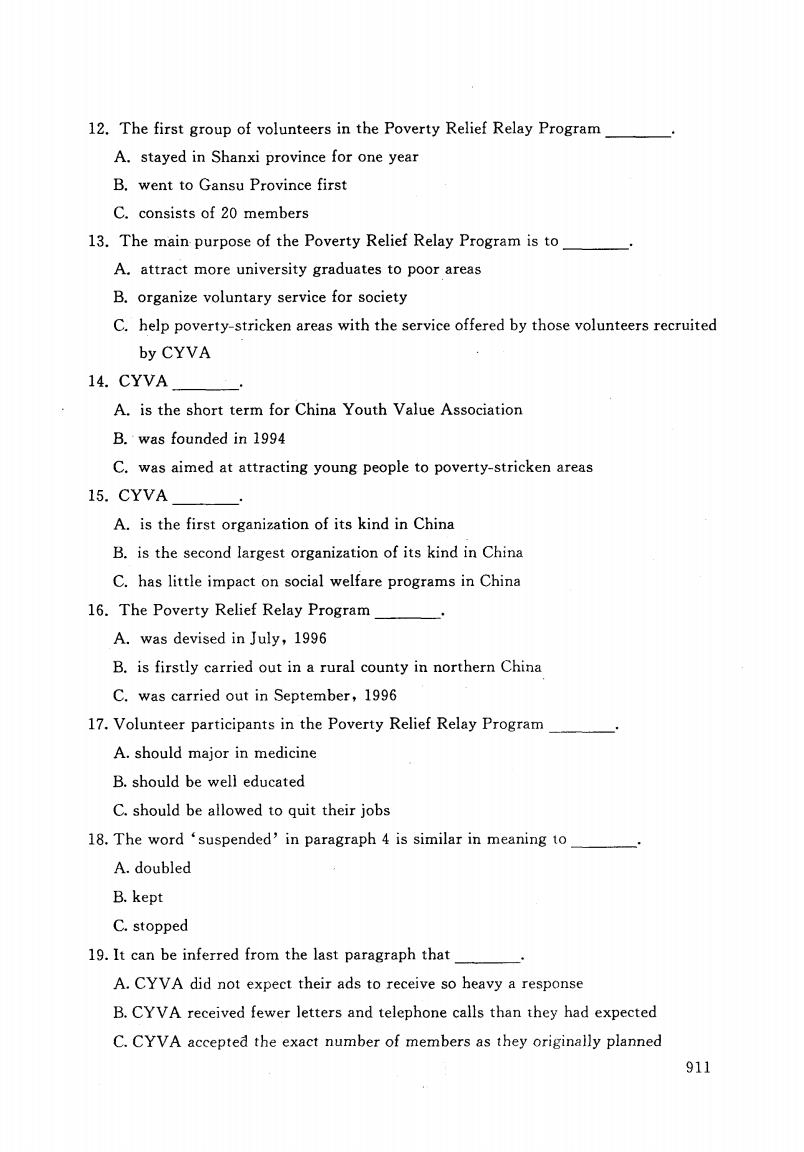
12.The first group of volunteers in the Poverty Relief Relay Program A.stayed in Shanxi province for one year B.went to Gansu Province first C.consists of 20 members 13.The main purpose of the Poverty Relief Relay Program is to A.attract more university graduates to poor areas B.organize voluntary service for society C.help poverty-stricken areas with the service offered by those volunteers recruited by CYVA 14.CYVA A.is the short term for China Youth Value Association B.was founded in 1994 C.was aimed at attracting young people to poverty-stricken areas 15.CYVA A.is the first organization of its kind in China B.is the second largest organization of its kind in China C.has little impact on social welfare programs in China 16.The Poverty Relief Relay Program A.was devised in July,1996 B.is firstly carried out in a rural county in northern China C.was carried out in September,1996 17.Volunteer participants in the Poverty Relief Relay Program A.should major in medicine B.should be well educated C.should be allowed to quit their jobs 18.The word 'suspended'in paragraph 4 is similar in meaning to A.doubled B.kept C.stopped 19.It can be inferred from the last paragraph that A.CYVA did not expect their ads to receive so heavy a response B.CYVA received fewer letters and telephone calls than they had expected C.CYVA accepted the exact number of members as they originally planned 911
12. The first group of volunteers in the Poverty Relief Relay Program stayed in Shanxi province for one year went to GansuProvince first members A. B. C. consists of 20 13. The main purpose of the Poverty Relief Relay Program is to_ . A. attract more university graduates to poor areas B. organize voluntary service for society C. help poverty-stricken areas with the service offered by those volunteers recruited by CYVA 14. CYVA A. is the short term for China Youth Value Association B. was founded in 1994 C. was aimed at attracting young people to poverty-stricken areas 15. CYVA A. is the first organization of its kind in China B. is the second largest organization of its kind in China C. has little impact on social welfare programs in China 16. The Poverty Relief Relay Program_ . A. was devised in July, 1996 B. is firstly carried out in a rural county in northern China C. was carried out in September, 1996 17. Volunteer participants in the Poverty Relief Relay Program_ . A. should major in medicine B. should be well educated C. should be allowed to quit their jobs 18. The word‘suspended' in paragraph 4 is similar in meaning to_ A. doubled B. kept C. stopped 19. It can be inferred from the last paragraph that A. CYVA did not expect their ads to receive so heavy a response B. CYVA received fewer letters and telephone calls than they had expected C. CYVA accepted the exact number of members as they originally planned 911

20.The findings from the survey by the local newspaper prove that A.most young people have never heard of the programme B.very few people are interested in the programme C.many young people are willing to offer some help to others PartⅢ Read Passage 3 and decide whether the following statements are true or false.Write T for true and F for false on your answer sheet.(20 points,2 points each) Passage 3 Care of the Elderly:A Family Matter 1 Who takes care of the elderly in the United States today?Many people wrongly believe that when people reach old age,their families place them in nursing homes,They are left there in the hands of strangers for the rest of their lives.Their grown children visit them only occasionally,but more often,they do not have any regular visitors.The truth is that this idea is an unfortunate myth-a fictitious story.In fact.family members provide over 80 percent of the care that elderly people need. 2 Samuel H.Preston,a sociologist at the University of Pennsylvania,studied how the American family is changing,He reported that by the time the average American couple reaches 40 years of age,they have more parents than children.This statistic shows the change in life-styles and responsibilities of aging Americans.The average middle-aged couple can look forward to caring for elderly parents some time after their own children have grown up.Moreover,because people today live longer after an illness than people did years ago, family members must provide long-term care.These facts also mean that after caregivers provide care for their elderly parents,who will eventually die,they will be old and may require care too.When they do,their spouses will probably take care of them. 3 Because Americans are living longer than ever,more psychologists and social workers have begun to study caregiving to improve care of the elderly.They have found that all caregivers share a common characteristic:All caregivers believe that they are the best person for the job,for different reasons.One caregiver said that she had always been close to her mother.Another was the oldest child.Another was the youngest child.In other words, they all felt that they could do the job better than anyone else.Social workers interviewed 912
20. The findings from the survey by the local newspaper prove that_ . A. most young people have never heard of the programme B. very few people are interested in the programme C. many young people are willing to offer some help to others Part lu Read Passage 3 and decide whether the following statements are true or false. Write T for true and F for false on your answer sheet. (20 points, 2 points each) Passage 3 Care of the Elderly : A Family Matter 1Who takes care of the elderly in the United States today? Many people wrongly believe that when people reach old age, their families place them in nursing homes, They are left there in the hands of strangers for the rest of their lives. Their grown children visit them only occasionally, but more often, they do not have any regular visitors. The truth is that this idea is an unfortunate myth一 a fictitious story. In fact. family members provide over 80 percent of the care that elderly people need. 2Samuel H. Preston, a sociologist at the University of Pennsylvania, studied how the American family is changing, He reported that by the time the average American couple reaches 40 years of age, they have more parents than children. This statistic shows the change in life-styles and responsibilities of aging Americans. The average middle-aged couple can look forward to caring for elderly parents some time after their own children have grown up. Moreover, because people today live longer after an illness than people did years ago, family members must provide long-term care. These facts also mean that after caregivers provide care for their elderly parents, who will eventually die, they will be old and may require care too. When they do, their spouses will probably take care of them. 3 Because Americans are living longer than ever, more psychologists and social workers have begun to study caregiving to improve care of the elderly. They have found that all caregivers share a common characteristic: All caregivers believe that they are the best person for the job, for different reasons. One caregiver said that she had always been close to her mother. Another was the oldest child. Another was the youngest child. In other words, they all felt that they could do the job better than anyone else. Social workers interviewed 912
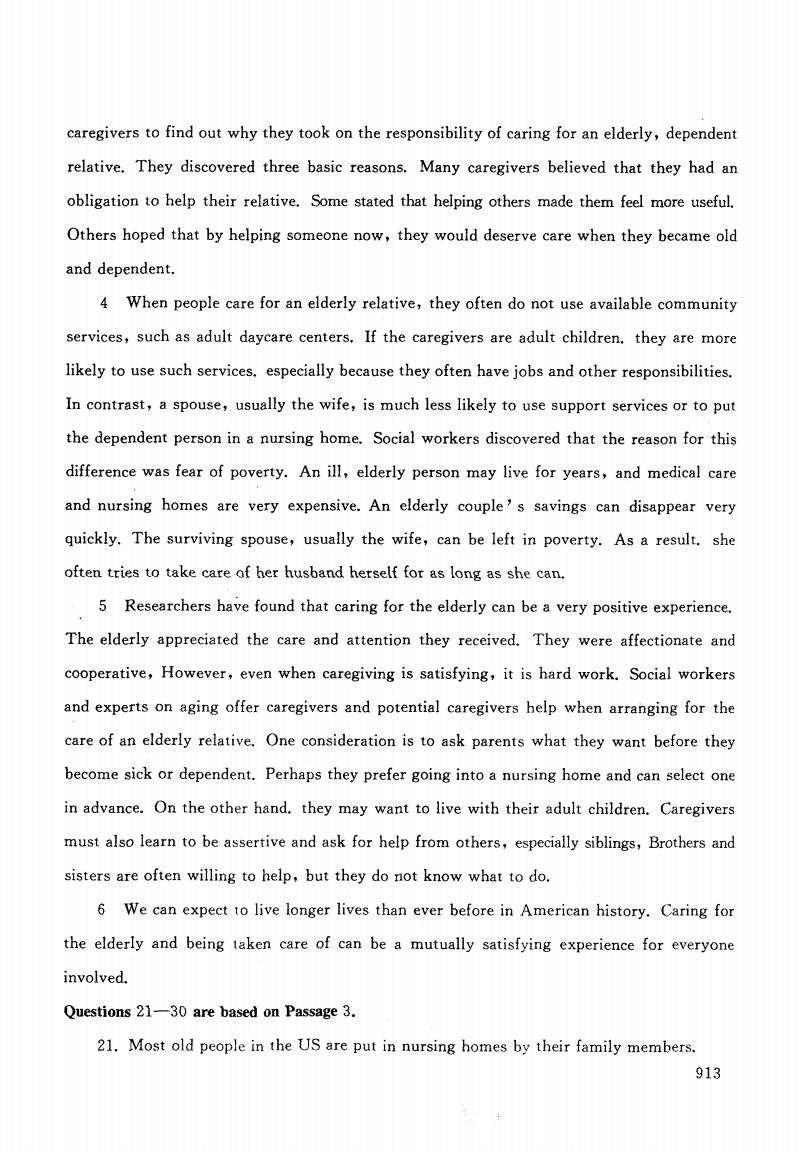
caregivers to find out why they took on the responsibility of caring for an elderly,dependent relative.They discovered three basic reasons.Many caregivers believed that they had an obligation to help their relative.Some stated that helping others made them feel more useful. Others hoped that by helping someone now,they would deserve care when they became old and dependent. 4 When people care for an elderly relative,they often do not use available community services,such as adult daycare centers.If the caregivers are adult children.they are more likely to use such services.especially because they often have jobs and other responsibilities. In contrast,a spouse,usually the wife,is much less likely to use support services or to put the dependent person in a nursing home.Social workers discovered that the reason for this difference was fear of poverty.An ill,elderly person may live for years,and medical care and nursing homes are very expensive.An elderly couple's savings can disappear very quickly.The surviving spouse,usually the wife,can be left in poverty.As a result.she often tries to take care of her husband herself for as long as she can. 5 Researchers have found that caring for the elderly can be a very positive experience. The elderly appreciated the care and attention they received.They were affectionate and cooperative,However,even when caregiving is satisfying,it is hard work.Social workers and experts on aging offer caregivers and potential caregivers help when arranging for the care of an elderly relative.One consideration is to ask parents what they want before they become sick or dependent.Perhaps they prefer going into a nursing home and can select one in advance.On the other hand.they may want to live with their adult children.Caregivers must also learn to be assertive and ask for help from others,especially siblings,Brothers and sisters are often willing to help,but they do not know what to do. 6 We can expect to live longer lives than ever before in American history.Caring for the elderly and being taken care of can be a mutually satisfying experience for everyone involved. Questions 21-30 are based on Passage 3. 21.Most old people in the US are put in nursing homes by their family members. 913
caregivers to find out why they took on the responsibility of caring for an elderly, dependent relative. They discovered three basic reasons. Many caregivers believed that they had an obligation to help their relative. Some stated that helping others made them feel more useful. Others hoped that by helping someone now, they would deserve care when they became old and dependent. 4When people care for an elderly relative, they often do not use available community services, such as adult daycare centers. If the caregivers are adult children. they are more likely to use such services. especially because they often have jobs and other responsibilities. In contrast, a spouse, usually the wife, is much less likely to use support services or to put the dependent person in a nursing home. Social workers discovered that the reason for this difference was fear of poverty. An ill, elderly person may live for years,and medical care and nursing homes are very expensive. An elderly couple’s savings can disappear very quickly. The surviving spouse, usually the wife, can be left in poverty. As a result. she often tries to take care of her husband herself for as long as she can. 5Researchers have found that caring for the elderly can be a very positive experience. The elderly appreciated the care and attention they received. They were affectionate and cooperative, However, even when caregiving is satisfying, it is hard work. Social workers and experts on aging offer caregivers and potential caregivers help when arranging for the care of an elderly relative. One consideration is to ask parents what they want before they become sick or dependent. Perhaps they prefer going into a nursing home and can select one in advance. On the other hand. they may want to live with their adult children. Caregivers must also learn to be assertive and ask for help from others, especially siblings, Brothers and sisters are often willing to help, but they do not know what to do. 6We can expect to live longer lives than ever before in American history. Caring for the elderly and being taken care of can be a mutually satisfying experience for everyone involved. Questions 21-30 are based on Passage 3, 21. Most old people in the US are put in nursing homes by their family members. 913

22.Samuel H.Preston studied how the elderly people were taken care of in nursing homes. 23.The average middle-aged couple can care for their elderly parents after their own children have grown up. 24.More psychologists and social workers have begun to study caregiving because the life expectancy of Americans is lengthening greatly. 25.The American psychologists and social workers haven't found anything in common among all caregivers. 26.American social workers have found three reasons for why the caregivers took on the responsibility of caring for an elderly. 27.Community services are frequently used by all caregivers. 28.A spouse is very likely to use community services or put his/her now-dependent spouse in a nursing home. 29.Taking care of the old people is hard even when they are affectionate and cooperative. 30.Brothers and sisters are often glad to provide help to caregivers when needed. Part M Read Passage 4 and answer the following questions.Make your answers as short and clear as possible.(20 points,4 points each) Passage 4 Pubs One thing Britain is famous for is pubs,and no trip to the UK would be complete without a visit to one of the thousands of pubs across the country. Pubs play an important Part in the social structure of the country.They are places where all ages and social classes mix to talk,do business,or just spend a couple of quiet hours before heading home in the evening. There are many different types of beer available in pubs.Traditional British beer is called bitter,or ale,and is usually served at room temperature.As a result,the British are 914
22.Samuel H. Preston studied how the elderly people were taken care of in nursing homes. 23.The average middle-aged couple can care for their elderly parents after their own children have grown up. 24. More psychologists and social workers have begun to study caregiving because the life expectancy of Americans is lengthening greatly. 25.The American psychologists and social workers haven't found anything in common among all caregivers. 26. American social workers have found three reasons for why the caregivers took on the responsibility of caring for an elderly. 27.Community services are frequently used by all caregivers. 28. A spouse is very likely to use community services or put his/her now-dependent spouse in a nursing home. 29.Taking care of the old people is hard even when they are affectionate and cooperative. 30.Brothers and sisters are often glad to provide help to caregivers when needed. PartW Read Passage 4 and answer the following questions. Make your answers as short and clear as possible. (20 points, 4 points each) Passage 4 Pubs One thing Britain is famous for is pubs, and no trip to the UK would be complete without a visit to one of the thousands of pubs across the country. Pubs play an important Part in the social structure of the country. They are places where all ages and social classes mix to talk, do business, or just spend a couple of quiet hours before heading home in the evening. There are many different types of beer available in pubs. Traditional British beer is called bitter, or ale, and is usually served at room temperature. As a result, the British are 914
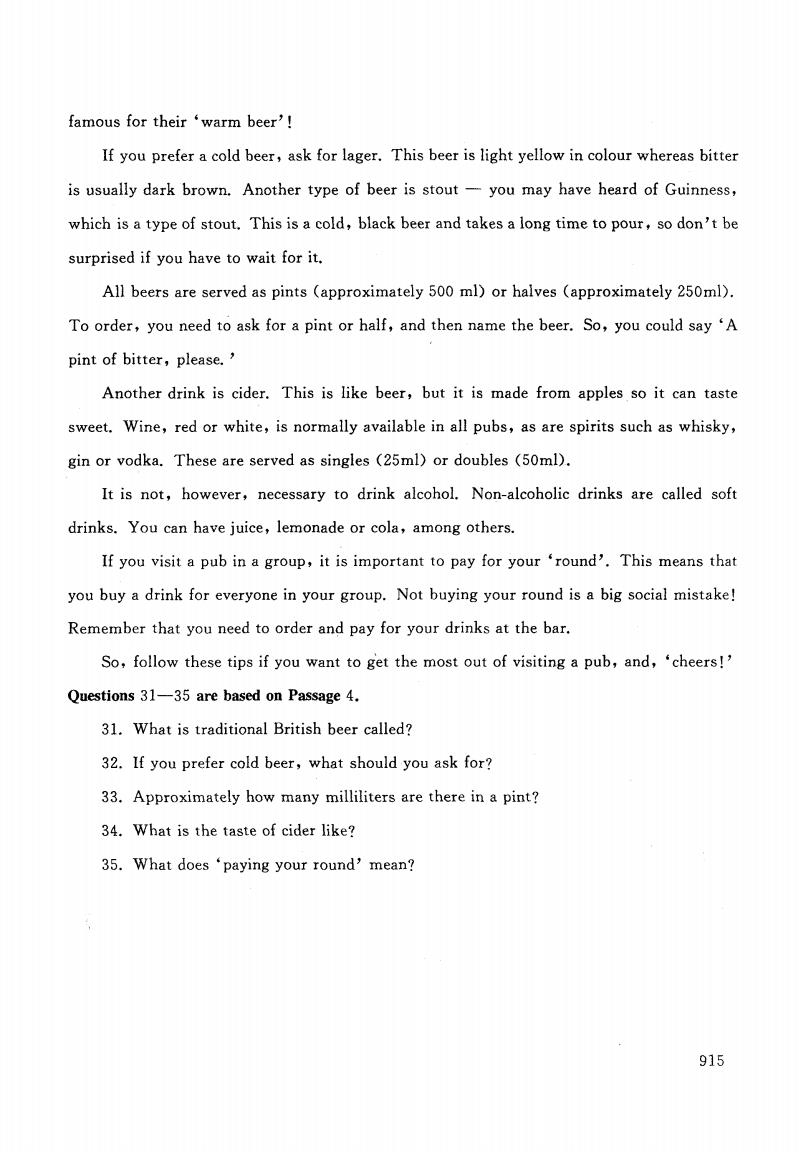
famous for their‘warm beer'! If you prefer a cold beer,ask for lager.This beer is light yellow in colour whereas bitter is usually dark brown.Another type of beer is stout-you may have heard of Guinness, which is a type of stout.This is a cold,black beer and takes a long time to pour,so don't be surprised if you have to wait for it. All beers are served as pints (approximately 500 ml)or halves(approximately 250ml). To order,you need to ask for a pint or half,and then name the beer.So,you could say'A pint of bitter,please.' Another drink is cider.This is like beer,but it is made from apples so it can taste sweet.Wine,red or white,is normally available in all pubs,as are spirits such as whisky, gin or vodka.These are served as singles (25ml)or doubles (50ml). It is not,however,necessary to drink alcohol.Non-alcoholic drinks are called soft drinks.You can have juice,lemonade or cola,among others. If you visit a pub in a group,it is important to pay for your 'round'.This means that you buy a drink for everyone in your group.Not buying your round is a big social mistake! Remember that you need to order and pay for your drinks at the bar. So,follow these tips if you want to get the most out of visiting a pub,and,'cheers!' Questions 31-35 are based on Passage 4. 31.What is traditional British beer called? 32.If you prefer cold beer,what should you ask for? 33.Approximately how many milliliters are there in a pint? 34.What is the taste of cider like? 35.What does‘paying your round'mean? 915
famous for their `warm beer'! If you prefer a cold beer, ask for lager. This beer is light yellow in colour whereas bitter is usually dark brown. Another type of beer is stout一 you may have heard of Guinness, which is a type of stout. This is a cold, black beer and takes a long time to pour,so don't be surprised if you have to wait for it. Allbeers are served as pints (approximately 500 ml) or halves (approximately 250m1). To order, you need to ask for a pint or half, and then name the beer. So, you could say‘A pint of bitter, please., Another drink is cider. This is like beer, but it is made from apples so it can taste sweet. Wine, red or white, is normally available in all pubs, as are spirits such as whisky, gin or vodka. These are served as singles (25m1) or doubles (50m1). It is not, however, necessary to drink alcohol. Non-alcoholic drinks are called soft drinks. You can have juice, lemonade or cola, among others. If you visit a pub in a group,it is important to pay for your‘round'. This means that you buy a drink for everyone in your group. Not buying your round is a big social mistake! Remember that you need to order and pay for your drinks at the bar. So, follow these tips if you want to get the most out of visiting a pub, and,‘cheers!’ Questions 31-35 are based on Passage 4. 31. What is traditional British beer called? 32.If you prefer cold beer, what should you ask for? 33. Approximately how many milliliters are there in a pint? 34. What is the taste of cider like? 35.What does‘paying your round' mean? 915
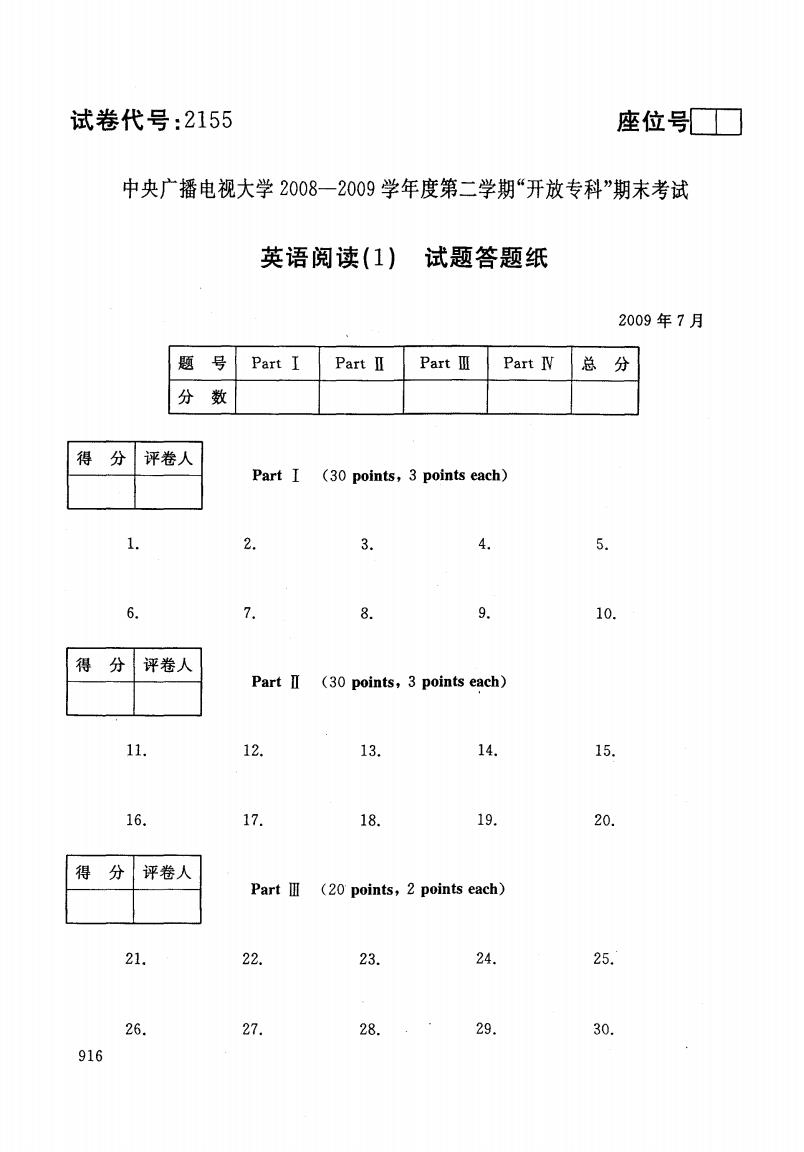
试卷代号:2155 座位号 中央广播电视大学2008一2009学年度第二学期“开放专科”期末考试 英语阅读(1)试题答题纸 2009年7月 题 号 Part I Part II Part亚 Part N 总分 分 数 得分 评卷人 Part I (30 points,3 points each) 1. 2. 3. 5. 6. 7. 8. 9. 10 得分 评卷人 Part II (30 points,) 11. 12. 13. 14. 15. 16. 17. 18. 19. 20. 得 分 评卷人 PartⅢ (20 points,2 points each) 21. 22. 23. 24. 25. 26. 27. 29. 30. 916
试卷代号:2155 座位号巨口 中央广播电视大学2008-2009学年度第二学期“开放专科”期末考试 英语阅读(1) 试题答题纸 2009年 7月 题 号 Part I Part I Part III PartW 总 分 分 数 得 分 评卷人 Part I (30 points, 3 points each) 得 分 评卷人 Partn (30 points, 3 points each) 得 分 评卷人 Partm (20 points, 2 points each 916

得分 评卷人 Part IV (20 points,4 points each) 35. 917
得 分 评卷人 PartW (20 points, 4 points each) 31 32 33 34 35 917